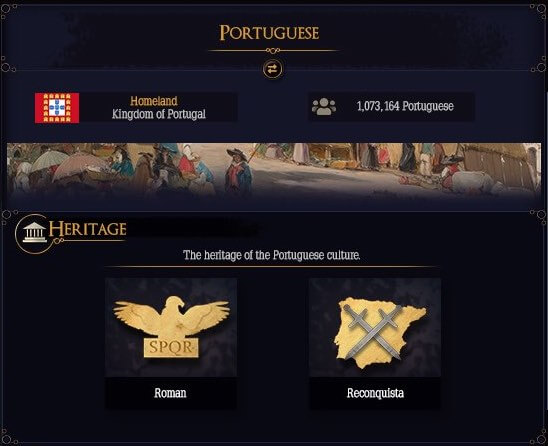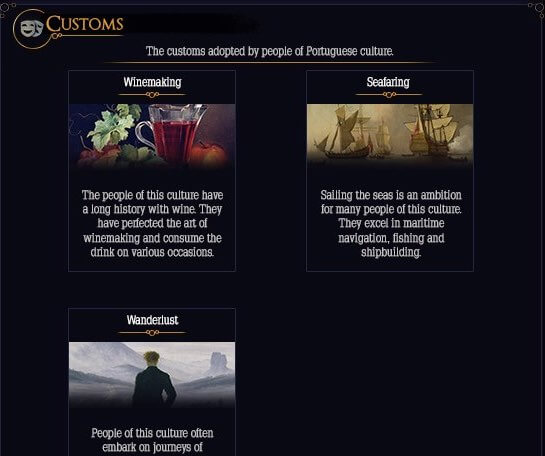Dev Diary #6: Culture
16:45, 9 Apr 2022

Hello everyone and welcome to the 6th development diary of Grey Eminence!
Today, we’ll explore how culture works in the game. As one of the primary demographic properties (alongside religion, social class, age, and gender), culture is inexorably linked to a lot of other mechanics, including some systems that we still haven’t announced yet! We’ll tease some of them a bit farther down, but for now let’s start by examining how cultures are structured.
In real life, culture is an umbrella term for a variety of concepts that relate to a given group of people. In the vast majority of historical cases, culture wasn’t codified or organized systematically, which makes it difficult to model in accurate and discrete terms that can be applied universally. Nevertheless, we’ve come up with a system that attempts to fairly represent as many cultures as possible.
In Grey Eminence, each culture is comprised of three separate attributes: heritage, language, and customs. These attributes are not static and can change over time, but you’ll see how in a little while.
Heritage
The first property we’ll look at is heritage. We define heritage as any event or circumstance in a culture’s past that has a permanent, recognizable impact on it. Remember: while Grey Eminence starts out in 1356, it stretches a full 600 years beyond that, so any source of heritage must be impactful enough to remain in the people’s consciousness throughout this time period.
Since heritage is supposed to be the bedrock of a culture’s identity, it is mostly immutable: generally it cannot be destroyed or altered. There are some exceptions to this - for example when new cultures emerge from old ones - but we’ll talk about that later.
We plan on attaching some high-level mechanics to heritage that mostly serve to steer the culture in a historically-appropriate direction. To give you an example, let’s look at the heritage of Portuguese culture. In 1356, the Portuguese have two primary sources of heritage: Roman, from their time as a province of the Roman Empire, and the Reconquista, from their struggle to expel the Moors over the previous six centuries.
First, let’s discuss why we’ve chosen these two particular sources of heritage. While the Roman Empire’s control over the lands of Portugal was almost a millennium in the past by 1356, it had nevertheless left an indelible mark on the people that lived there. Notably, it introduced both Vulgar Latin (the precursor of the Portuguese language) and Christianity. The Reconquista, on the other hand, was freshly completed in the Portuguese lands in 1356; it would leave a deep religiosity among the people and a strong deference to religious authorities for centuries to come.
In contrast, we felt that the Visigothic legacy of the Portuguese wasn’t strong enough to include as a source of heritage. While the structures of nobility and feudalism date to Portugal’s Visigothic period, we didn’t find a strong enough cultural impact on the people to warrant such an inclusion. Of course, all these points are subject to intense discussion and aren’t final, but we just wanted to give you a look into how we make these decisions behind the scenes.
So, what do the mechanics of these sources of heritage look like? One of their primary functions is to influence the high-level behavior of characters that belong to cultures with that heritage. For example, we can encourage rulers (or elites) with Roman heritage to assist other such rulers when they’re under attack by non-Roman enemies (with a greatly increased likelihood if the attacker is also non-Christian) - or to engage in liberation wars if Roman-heritage cultures are already suffering under someone’s yoke.
In this way, we can nudge the game in a historically-plausible direction: it should be difficult for Muslim polities to make a reverse-Reconquista or to gain a foothold in Italy, whereas the Balkans will have no such cross-cultural solidarity to protect them. Speaking of the Reconquista, heritage can also impact the behavior of populations: people with the Reconquista heritage will be harder to convert away from Catholicism and will be more upset than usual when attempting secularization.

We’re still actively debating on how broad to make the heritage system, so nothing you see here (or anywhere else) is final.
Language
The second defining trait of every culture is its language. Unlike heritage, language is a trait that may very well change during the course of the game. To be fully clear, we are not going to simulate writing systems or grammatical/lexical changes. Such a level of detail would be too difficult to implement for the whole world and wouldn’t add enough meaningful gameplay to justify the development cost. As such, languages in Grey Eminence are static, although cultures can change the language they use (more details on that in a second).
Every language belongs to a specific language family. Going back to our Portuguese example, the Portuguese language is part of the Romance family, alongside many other languages like Castilian, Occitan, and Sardinian. Languages within the same family have a similar (albeit much weaker) effect of providing cross-cultural solidarity.
The most tangible impact of languages in the game is for character relations. Most characters know their native language and one or two others at best. Obviously, this makes it difficult to build deep relationships with other characters that don't speak any of the languages they're fluent in. Yet it also opens up an interesting opportunity for player agency: educate your heirs in the language of your enemies and you'll find it a lot easier to engage in diplomacy with them or to meddle in their affairs. But more on that in our characters dev diary.

A language need not be limited to just a single culture. In some cases, esp. with colonialism, a single language can expand to be spoken by entire continents.
Customs
The final component of every culture is customs, which we define as any widespread activity or behavior that is practiced by members of that culture and that has meaningful consequences. This is a very broad definition, so to be clear we're only adding customs that will have some sort of impact on gameplay (we're leaving flavor customs to modders, for now).
Unlike heritage, a culture's customs can change over the course of the game. History is rife with examples of people (and their behavior) adapting to circumstances, so we've designed customs to reflect that. Every custom has unique conditions that must be reached for a culture to adopt it and maintained for a culture to retain it over time. To illustrate how that works, we'll once again return to our Portuguese friends.
In 1356, the Portuguese culture starts with three different customs: winemaking, seafaring, and wanderlust. These customs reflect behavioral patterns in Portugal that were either fully developed or were in the process of developing at the time. Obviously, they're genericized and are not perfectly suited for the exact historical circumstances of Portugal in 1356, but alas that is the price we must pay for our systemic approach.
For now, let's look at winemaking. It has two population-wide effects: it increases the desire of Portuguese people to consume wine and slightly increases wine production by Portuguese wineries. Another impact is on character behavior, where wealthy Portuguese characters might try to start their own wineries even if the economic conditions for that aren't ideal.
So, what makes a culture get into winemaking? Well, the natural first requirement is for the majority of that culture's population to live in tiles suitable for growing grapevines. The second requirement is for the population to already be consuming a certain amount of wine, which might sound like it would create a chicken-and-egg problem, but keep in mind that there are other ways to increase wine consumption (for example, many Christian denominations feature wine in their sacraments). The third requirement is for the culture to already have a certain number of wineries per capita, as building up the skill and traditions of winemaking takes a lot of trial and error. The Portuguese culture starts with this custom already adopted, but it can naturally emerge for any culture as long as it fulfills the conditions for enough years - and, conversely, winemaking might be forgotten should a culture stop fulfilling its requirements over a long period of time.

You can probably guess what the effects and triggers of the other Portuguese customs are. We’ve made them generic so that they can potentially appear for as many cultures as possible.
Homeland
Now that we’ve gone through the structure of cultures, we can take a look at some of its effects. In line with our systematic approach, we’ve assigned each culture a homeland, a country that all members of that culture will recognize as their home. Homeland countries have a few notable benefits (and a few more that we can’t disclose yet): they’re much more likely to attract immigrants of their culture and always accept their culture for the purposes of discrimination and citizenship. In general, once the era of nationalism has arrived, homeland countries have a lot of advantages in stability, but that’s a topic for another time.
Divergence
One of the mechanics that makes Grey Eminence’s cultural system dynamic is the ability of cultures to diverge on their own. This is an irreversible process that creates a new culture out of an existing one with at least somewhat different properties. There are a few requirements for divergence to happen: for example, the original culture must not reside in its homeland. Divergence is more likely to happen when a culture is exposed to a different culture, with the effect scaling with the magnitude of the differences. In this case, the newly diverged culture will contain characteristics of both its original culture and the one(s) that inspired its divergence. Notably, it will open up the possibility of carving out its own homeland and of establishing its own language. All these processes can also be initiated by the player manually, but what makes the system feel alive is that they can happen on their own under the right conditions.
Branches, Groups & Supergroups
In the same way that we group languages into families, we also group cultures into branches, groups, and supergroups. These categorizations allow us to include cross-cultural mechanics similar to the Roman heritage solidarity we discussed previously (albeit in a weaker form) and to provide AI countries with rough geographic guides on which countries they should care more or less about. We’ve also added potential homelands for each branch, group, and supergroup to simulate the (usually unlikely) case of emerging cultural unions. This is part of our system of formable countries, so you’ll learn more about it later down the line.
Moddability
As usual, we’ll also discuss the ways in which you can mod the culture system. In the background, heritage, language, customs, homelands, branches, groups, and supergroups are merely properties attached to each culture. Through the world editor, you can make a variety of content-style changes like adding, editing, or removing properties, yet with some additional C# efforts you can also change the way the system interprets these properties. In essence, you can attach new mechanics onto existing properties or even add new properties altogether. For example, while we won’t have the opportunity to expand the language mechanic beyond a static differentiator, you can layer additional mechanics on top to create an evolving language system. Like religion previously, culture can also be hijacked in all manner of ways for fantasy modding, especially with magic and similar supernatural phenomena. We’re sure you’ll come up with mechanics we didn’t even knew could exist and we can’t wait to see them!
That’s all for today, thanks for reading! Keep an eye out for the next dev diary on April 23, and until then make sure you’ve joined our Discord and Subreddit, and follow us on YouTube, Facebook, and Twitter. See you then!


 Back
Back